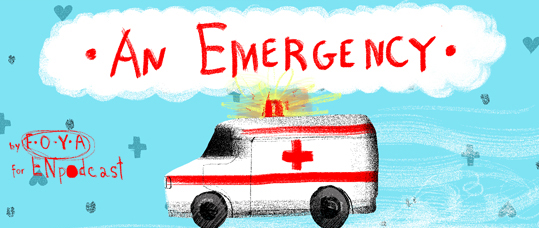An Emergency
A small black car was standing still right in the middle of a road and remained motionless without turning on any alarm lights. Two or three people had already come up to look at what was going on. They created a little commotion around it, and yet the car seemed eerie quiet. "We need help over here," a voice was heard. I don't know whether it was curiosity or fear, but some unknown force pushed me right into the center of the scene in front of me. I stepped up closer. The driver of the black Volkswagen was sitting buckled up in his seat shaking violently back and forth with his eyes rolled up. “Oh my God, he is having a seizure,” I thought to myself. The Earth started escaping from under my feet and all colors seemed to dim as my own hands grew colder and the heart started to race. “What are those signs of a stroke I read about online? What if it's a blood clot? Or a heart attack? What should I do? What can I do?” thoughts rushed through my mind. “Has anyone called for an ambulance?” I said to the other people around. From the few startled looks I reckoned that no one had. “ What the heck?!” struck like a lightning through my head, but there was no time to get surprised or angry. Scrambling to remember any emergency rescue number that would work from a mobile phone, my common sense was already dismissing pictures of helicopters and loud ambulance sirens that I really wished were on the way to help us. The operator spoke clearly and calmly and requested that the man is not moved and I stay at the site until the doctors arrival. A large construction truck stopped behind the Volkswagen and honked. A trolleybus barely made it around the car. Gapers would be driving very slowly in order to have a nice long look at what was happening in the car. The crowd of people grew larger and larger. The driver, who was very pale and covered with sweat, would get quiet and then start shaking all over again. “He's a drug addict!” Someone said. “Get him out of the car!” another person suggested. It took will power and much effort to ward off all the unwanted help. It was a warm and bright sunny day in a small Ukrainian city, but the flow of time must have frozen that afternoon. Every next minute was longer than the previous one. As the sick man lost and regained his consciousness every few seconds, I was desperately trying to recall the steps necessary for resuscitation readying myself for the worst case scenario. My own hands and feet were becoming quite feeble from the thought that he might completely collapse there.
Finally, in what seemed like eternity, the help arrived. An ancient looking ambulance car pulled in slowly from a parallel street. Unobtrusive sound of a siren announced the appearance of the car a couple of seconds earlier. You wouldn't be able to tell that those people were in a hurry. A senior looking paramedic stepped out of the ambulance. I was uncertain of who looked shabbier the doctor or the car. After a quick look at the patient she recognized him. He was a respectable citizen, who lived nearby, was a diabetic and was very familiar to them because of his frequent episodes of hypoglycemia (which is a condition with extremely low blood glucose levels). A tired looking male nurse came out of the ambulance carrying orange colored stretcher and pushing away the gapers to make room for the driver to be carried away.
I lingered a couple more minutes, not knowing why. My own stomach started to feel nauseated. All thoughts left me. I just stood there looking at the crowd around the ambulance and an empty unguarded Volkswagen car with open doors. “What if this guy hadn't been driving a car? Would anyone have come up to him if he had just fallen on a side of a street like a drunk? What if this was me?”













![Short 'o' vs long 'o': [ɒ] vs [əʊ]](/systemImages/7/9/0/4//94ec0248fc17d3422069284beedd2afa_171_400.jpg)


